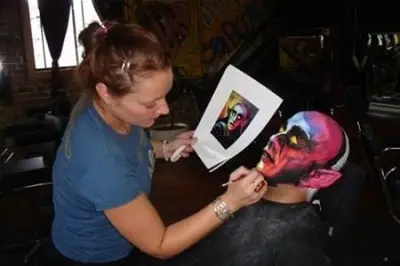Salary, Job Description, How To Become One, and Quiz
.jpg)
Theatrical Makeup Artists
Theatrical Makeup Artists apply makeup to performers to reflect period, setting, and situation of their role.
Table of contents
What they do
Theatrical Makeup Artists apply makeup to performers to reflect period, setting, and situation of their role.
- Apply makeup to enhance or alter the appearance of people appearing in productions such as movies.
- Select desired makeup shades from stock, or mix oil, grease, and coloring to achieve specific color effects.
- Duplicate work precisely to replicate characters’ appearances on a daily basis.
- Cleanse and tone the skin to prepare it for makeup application.
Typical day
On a daily basis, Theatrical Makeup Artists assess performers’ skin types to ensure that makeup will not cause break-outs or skin irritations. They confer with stage or motion picture officials and performers to determine desired effects.
- Cleanse and tone the skin to prepare it for makeup application.
- Provide performers with makeup removal assistance after performances have been completed.
- Analyze a script, noting events that affect each character’s appearance, so that plans can be made for each scene.
- Study production information, such as character descriptions, period settings, and situations, to determine makeup requirements.
- Apply makeup to enhance or alter the appearance of people appearing in productions such as movies.
Other responsibilities
Besides their typical day, Theatrical Makeup Artists also create character drawings or models, based upon independent research, to augment period production files. They may also analyze a script, noting events that affect each character’s appearance, so that plans can be made for each scene.
On a weekly to monthly basis, Theatrical Makeup Artists establish budgets and work within budgetary limits. They might also design rubber or plastic prostheses that can be used to change performers’ appearances.
In addition, they requisition or acquire needed materials for special effects, including wigs, beards, and special cosmetics.
Although specific duties may vary, many of them study production information, such as character descriptions, period settings, and situations, to determine makeup requirements.
To some Theatrical Makeup Artists, it is also their responsibility to advise hairdressers on the hairstyles required for character parts.
What is the job like
Job satisfaction
Is this job meaningful
80% said they were satisfied with their job and 54% said they found their job meaningful.
My typical day So my typical day starts the day before I actually report to set / or on location. The day before I review my call sheet and spend a few hours cleaning my kits, disinfecting products, and obsessively checking to make sure nothing was misplaced or finished. Often time I have to do … Read More
My typical day as a hair and makeup artist on set for film and television is preparing my gear and kit the night before I arrive on set which takes 2-3 hours. Days typically start at 7:00 a.m. and end at 7:00 p.m. (12 hr days), I arrive before talent to organize my tools and … Read More
My name is Kerrin Jackson and I’m a film/tv makeup artist. My Typical Day A typical working day usually starts between 3.00 am and 6.00 am for a film makeup artist. It varies each day, depending on what characters play in the scenes shooting on any given day. And even though schedules are produced to … Read More
Pros
Suitable for people who like to work with designs.
Suitable for people who value relationships between co-workers and customers and want to work in a friendly non-competitive environment.
It is not too difficult to get into this career. Previous work-related skill, knowledge, or experience is required to get started.
Very good salary.
Cons
Not suitable for people who like to follow routines.
Long working hours (More than 40 hours per week).
How much do they make
Average salary
Average hourly wage
Entry-level Theatrical Makeup Artists with little to no experience can expect to make anywhere between $38,010 to $63,220 per year or $18 to $30 per hour.
| Salary by experience | Annual | Hourly |
|---|---|---|
| Highest (Top 10%) | $157,680 | $76 |
| Senior (Top 25%) | $132,530 | $64 |
| Median | $106,920 | $51 |
| Junior (Bottom 25%) | $63,220 | $30 |
| No experience (Bottom 10%) | $38,010 | $18 |
This table shows the top 10 highest paying industries for Theatrical Makeup Artists based on their average annual salary.
| Salary by industry | Annual | Hourly |
|---|---|---|
| Motion Picture and Video Industries | $111950 | $53.82 |
| Employment Services | $97570 | $46.91 |
| Performing Arts Companies | $67650 | $32.52 |
| Personal Care Services | $53560 | $25.75 |
View more salary by industries here.
Where can they work
Where can Theatrical Makeup Artists work? Here is a table showing the top 10 largest employers of Theatrical Makeup Artists including the average salary in that industry.
| Employers | Total Employed | Annual Salary | Hourly Wages |
|---|---|---|---|
| Motion Picture and Video Industries | 2100 | $111950 | $53.82 |
| Personal Care Services | 380 | $53560 | $25.75 |
| Performing Arts Companies | 70 | $67650 | $32.52 |
| Employment Services | 50 | $97570 | $46.91 |
What is the work day like
Working hours
Working schedule
How often do you use email in this job?
Telephone
How often do you have telephone conversations in this job?
Group discussions
How often do you have group discussions in this job?
Public speaking
How often does this job require you to do public speaking?
Level of competition
How much competitive pressure is in this job?
What is the work environment like
Office-style environment
Indoors in an environmentally controlled condition
Warehouse-style environment
Indoors in a non-controlled environmental condition such as a warehouse
Outdoors
Outdoors exposed to all weather conditions
Outdoors – Under Cover
Outdoors but under cover (e.g. structure with roof but no walls)
How to become one
Difficulty to become one
Required level of education
What level of education do you need to perform the job?
Relevant majors
Cosmetology/Cosmetologist
Make-Up Artist/Specialist
Permanent Cosmetics/Makeup and Tattooing
Relevant work experience
How much related work experience do you need to get hired for the job?
On The Job Training
How much on the job training do you need to perform the job?
Should you become one
Best personality type for this career
People with this personality likes to work with designs and patterns. They prefer activities that require self-expression and prefer work that can be done without following a clear set of rules.
People with The Builder personality type likes practical and hands-on work. They prefer working with plants, animals, and real-world materials like wood, tools, and machinery.
People with The Thinker personality likes to work with ideas that require an extensive amount of thinking. They prefer work that requires them to solve problems mentally.
People with The Artist personality likes to work with designs and patterns. They prefer activities that require self-expression and prefer work that can be done without following a clear set of rules.
People with The Helper personality type likes to work with people and in teams. They prefer work that allows them to build relationships with others.
People with The Leader personality likes to start and work on projects. They also like leading people and making many decisions.
People with The Organizer personality type likes to follow set procedures and routines. They prefer working with data and details more than with ideas.
You can read more about these career personality types here.
People who are suitable for this job tend to like working with forms, designs, and patterns. They often require self-expression and the work can be done without following a clear set of rules.
They also like work activities that include practical, hands-on problems and solutions. They like working with plants, animals, and real-world materials like wood, tools, and machinery.
Take this quiz to see if this is the right career for you.
Work Values
Which values are the most important to a person’s satisfaction for this job?
You are someone who is results oriented. You prefer work that allows you to utilize your skills and abilities while at the same time giving you a sense of accomplishment.
You are someone who values job security, steady employment, and good working conditions. You also prefer work that keeps you busy all the time with something different to do every day.
You are someone who values job advancement and leadership roles. You prefer work that receives recognition for the work you do and jobs that are looked up to by others in the company and your community.
You are someone who likes to provide a service to others. You prefer a work environment where you can work with your co-workers in a friendly non-competitive environment.
You are someone who values a company that stands behind their employees. You prefer a work environment where everyone is treated fairly and is being supported by the company.
You are someone who likes to work on your own and make your own decisions. You prefer work that requires little supervision and are allowed to try out your own ideas.
Don’t know which career to pursue?
Take the career quiz to find careers that match your personality type.
Take The Career Quiz


.jpg)




.jpg)
.jpg)
.jpg)
.jpg)
.jpg)
.jpg)
.jpg)
.jpg)
